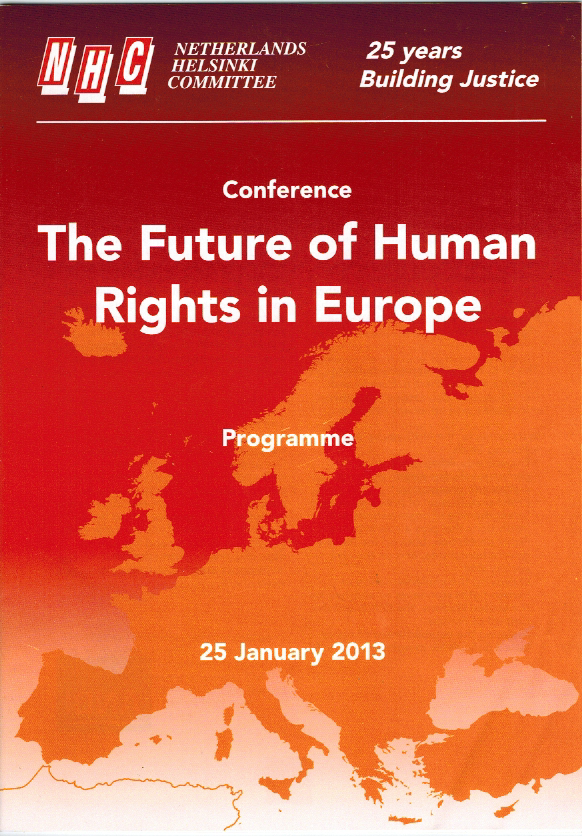On Friday january 25 I attended the 25 year anniversary of the Dutch Helsinki Committee (NHC). Several important people held speeches, and they were interesting. But it also confronted me with a question.
The anniversary was celebrated with a one day conference themed “The future of human rights in Europe” with several eminent speakers and or workshop leaders. Council of Europe Commissioner Nils Mužinieks held a keynote speech full of “doom and gloom” but also with a bit hopeful conclusions. strategic consultant Dirk Steen (ex global planning Amnesty) gave some very interesting possible scenarios for the year 2020; One where the bankers finally have been arrested, production is localized thanks to 3D printing and energy is solar, or aeolic. Or a doom scenario: The Greek crisis continues in the rest of Europe, dictatorships on the rise, unemployment on the rise everywhere, censorship and surveillance on Internet business of the day … A global sociopolitical economic SWOT. The future might lie with “Occupy 2.0”, the Young Angry Women. An organized and coordinated fight with the powers that be. Interesting to see the reactions in the audience on the different scenarios.
Much was spoken on the collapse of the (western) economies, the barbaric contemporary capitalism, the rising racism in Greece and Hungary, the dangers for the constitutional state … Very important.
There were workshops on EU human rights strategy, on the situation of the Roma people, transitional justice, the problems of migration politics in Europe (what we did not learn). Masterclasses on the European court and on anti terrorism and human rights. And there was one workshop on sex work and trafficking, plus a lecture on LGBT human rights work in Europe.
That brings me to my observation: there was very little attention for sexual and reproductive rights. Nor for gender related issues. The sex work workshop was good, considerably more positive for sex workers rights than I had imagined beforehand. But it was only about women in sex work, so a limited perspective. I brought the trans perspective in (many many trans people are doing sex work for some time in their life). A perspective of gender and power was not clearly present. But I think the many attendants found it a useful or informative workshop. The lecture on LBGT human rights as human rights was a useful summing up of the recently created human rights ‘jurisprudence” and soft law, statements by high-placed functionaries. But hardly a thing more than this enumeration.
This makes me wonder: is it so difficult to bring women’s rights, LBGTIQ human rights, sexual and reproductive health issues into the mainstream human rights discourse? Why do issues about sex, gender and sexuality always stand apart? Only when mass rape is used as a weapon of mass terrorization in a war, sex and sexuality enter mainstream discourse. Is this because of judicial or political unease?
Of course there is the recent CoE convention combating and preventing Violence against Women. Very young still, not much signatories yet (Turkey, being the host country, ironically the first state to ratify it). Mužinieks thinks it has a great future. Further practically it is best to use the entry way of combating and preventing hate speech and hate crime. And to get ombudsmen cooperating. They are many times very silent. The European approach is to take measures close to home, whereas the UN system is more of global and regular, regulated control instances. But still, to me that does not explain why sex, gender and sexuality issues stay outside mainstream human rights discourse, that does take racism as an issue.

Thanks for sharing this information and also thanks for representing
on gender and human rights. Definitely disappointing news in those
areas but hopefully within not a huge amount of time these will proceed from
the back burner to the front.
It was interesting to see that the issue of Roma was so much “sexier” than LGBTI, People seem to understand that discrimination of ethnic minorities is not done anymore, while rights related to ones body and feelings are interpreted from a personal point of view and not from a rights perspective. Are the human rights academics afraid of the issue?